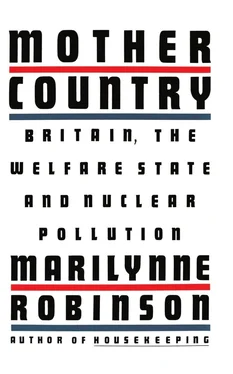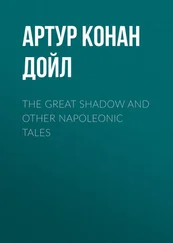Greenpeace, since it enjoys the goodwill and the financial support of a great many people in this country, surely owes them a reasonably accurate description of the state of the world, as well as information which could directly affect their own and their families’ well-being. If Greenpeace takes exception to the usual accounts of the lethal properties of plutonium — for example, that a particle invisible to the naked eye, if inhaled into the lung, will ultimately cause a cancer — then they should tell us so. If they adhere to the common view, then they should explain why they allow tourists to wander into an area where this misfortune is so liable to befall them.
It seems to be the policy of Greenpeace to compartmentalize its activities, at least to the extent of keeping Americans preoccupied with issues that arise within our borders — and with aquatic fauna, whose trials and troubles seem never to include ingestion of radioactive fish in the Irish Sea or the North Sea.
If the decision to publicize environmental problems selectively is tactical, then it is past time for Greenpeace to admit that the approach has failed. The greatest source of radioactive pollution in the world is growing exuberantly, fed by an influx of yen that makes it Britain’s greatest earner of that potent currency.
It is in fact difficult to imagine any strategy that could have produced a less desirable result. While the effect of relatively stringent environmental laws in Europe has been to siphon waste into Britain, Greenpeace chalks up triumphs of environmental consciousness without reference to the fact that the scene of contamination has merely shifted, not very far, and that a powerful economic reward has been provided for the recalcitrance of the British government in environmental matters. These tactics make it difficult for Sellafield’s foreign clients to use crude disposal methods at home, but do not put pressure on them to develop responsible methods, or indeed to accept responsibility for the environmental consequences of their own industries. Britain can bear the opprobrium of Europe and Europe can endure the malfeasances of Britain. The nuclear industry can enjoy the cheapest possible solution to the problems of waste — the costs of dumping are, you will recall, indemnified by the production of uranium and plutonium, the latter a valuable commodity for reasons that are never quite made clear.
If information published by Greenpeace in Britain were published by Greenpeace in America, the system might not work so smoothly. It would be highly sensitive to reaction in this country manifested in reduced investment and tourism, a reduced enthusiasm for European products, an increased skepticism as to the disinterested wisdom of European governments, and perhaps a less reflexive confidence in the community of values which is always adduced to persuade us that in defending Europe — and especially Britain — we are only defending ourselves.
If it is a tactic or strategy to select and ration the truth, in order to direct public reaction toward ends the organization considers desirable, then they have violated the most basic tenets of democracy, even while producing a spectacular vindication of the wisdom of these tenets. Sellafield is a disaster. It violates common decency and common sense. It is the sort of thing that withers under informed public scrutiny — from which, to the misfortune of this beleaguered planet, it has been sheltered in America. The regularity with which foolish and destructive policies are concealed from the public is the most powerful statement possible of what democracy could have meant to the world, if there had been the courage and patience to sustain it.
The considerable involvement of Greenpeace and Friends of the Earth, which is associated with the Sierra Club, should mean a flow of exact and urgent information about Sellafield into the American environmental movement and its publications. Something else has happened. In 1984, the Sierra Club published a book by Walter Patterson, called The Plutonium Business , which drops its tone of objective description of nuclear facilities in other parts of the world to attack a headline in the London Daily Mirror (October 1975) which said Britain was to become the world’s “Nuclear Dustbin.” This characterization is in fact commonplace and fairly precise, considering the service Sellafield performs for Britain and the world at large. Reading The Plutonium Business , one would never guess that Britain is the center of the world plutonium business. Walter Patterson is active as a writer on nuclear questions in the British press. His omissions cannot reflect ignorance. The Sierra Club should also be aware of Sellafield in some detail, if they are in communication with Friends of the Earth in Britain, since this has been an issue of overwhelming importance in Britain and Europe for a number of years, highlighted by the leukemia deaths of children on the English and Irish coasts. Friends of the Earth figures in many inquiries and demonstrations. While it is possible to imagine that these organizations do not communicate with their associates, or pool information, and that they are by intention parochial and intramural, it behooves them to make this clear, and to abstain from publishing books like Mr. Patterson’s which mislead by seeming to deal in an authoritative way with international phenomena.
The silence of the American press (there was an excellent article in Newsday by Patrick J. Sloyan, May 20, 1986) is consistent with a more general failure to report news of substance from abroad. Nothing is stranger than to live in Britain and read what American newspapers and magazines print about it. If it were the sworn duty of the American press to render the United States incompetent in every aspect of foreign affairs, our journalism would be very little different from what we have at present. The hundreds of reports about Sellafield in major British newspapers and on television yielded slight, late, perfunctory articles by Joseph Lelyveld in The New York Times and Karen DeYoung in The Washington Post , both of which concluded that it was all a tempest in a teapot, more or less. The locals (those people whose children tend to die in disturbing numbers) felt no concern about the plant, according to these articles. DeYoung notes that the many tourists “never seem to mind the site.” Times and Post readers no doubt. The anxiety, these articles agree, is all in London.
People from the area have in fact flung Cumbrian silt through the door of 10 Downing Street, and seen it cleaned away by men in radiation gear. People from the area have raised money to buy Geiger counters, so that they will not have to depend on the government for information about their circumstances. There have been demonstrations, strikes, and votes of no confidence in the management at intervals over thirty years.
Neither the Times nor the Post mentions the lake of plutonium and other radioactive substances which lies off the Cumbrian coast. Both mention alarm caused by leukemia cases too few to be statistically reliable, repeating a bitterly disputed claim by the British government; that is, by the plant’s owners and operators. In fact, one child in sixty dies of cancer in the village nearest the plant, and rates in other villages in the region are comparable. To find ambiguous these high rates of a radiation-induced illness in a radioactive environment seems to me willful at best. But the American press has a tourist-bus mentality, a keen and persisting interest in pubs and arts festivals, and will seek out what it considers “typical” and “authentic” while one example of either remains on earth, at the same time ignoring whatever fails to confirm its very banal expectations. There is nothing sinister in any single instance of failure in an institution which fails routinely.
Читать дальше








![Nicholas Timmins - The Five Giants [New Edition] - A Biography of the Welfare State](/books/701739/nicholas-timmins-the-five-giants-new-edition-a-thumb.webp)



